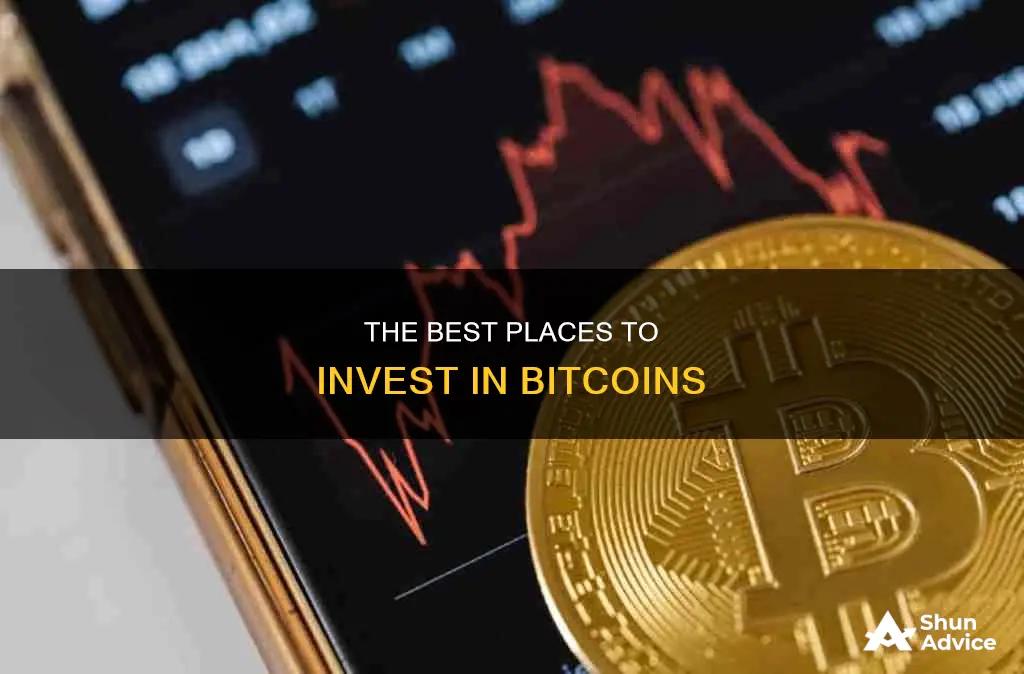
Bitcoin has been described as one of the most amazing currencies in human history. It is a digital currency with no intermediaries or banks, and its value is based on the trust that the Bitcoin community places in it.
There are several ways to invest in Bitcoin, each with its own advantages and disadvantages. You can buy and hold Bitcoin in your personal wallet, trade it by buying at a low price and selling at a higher price, or mine it by solving problems with computers. You can also invest in Bitcoin through exchange-traded funds (ETFs) or buy shares in a fund that has invested in Bitcoins.
Before investing, it is important to understand the risks associated with Bitcoin, such as its extreme volatility and the potential for fraud and theft through uninsured exchanges. Additionally, it is crucial to do your own research, only invest what you can afford to lose, and be prepared for the possibility of losses.
| Characteristics | Values |
|---|---|
| Ways to invest in Bitcoin | Buy and hold (aka hodling), trade, mine, or invest in a fund that has invested in Bitcoin |
| Risks | Bitcoin is extremely volatile and is not backed or regulated by a government or other entity |
| How to buy Bitcoin | Through a cryptocurrency exchange, a peer-to-peer exchange, a specialised ATM, or a payment processor like PayPal |
| Bitcoin wallet options | "Hot" wallets (online wallets or apps on devices), "cold" wallets (offline wallets or hardware wallets), or paper wallets |
| Bitcoin exchange options | eToro, Coinbase, Kraken, Gemini, River.com, Uphold, Bitcoin IRA, etc. |
| Bitcoin ATMs | Available in over 50 countries, including the USA and the UK, with fees ranging from 5-10% |
| Bitcoin value | Determined by the trust the Bitcoin community places in it; not backed by intrinsic value like gold or silver |
| Bitcoin transactions | More transparent than cash transactions but more traceable than credit card transactions |
| Bitcoin advantages | Eliminates the need for banking transaction fees, offers greater privacy than credit cards, and has the potential to radically change the way financial transactions are facilitated |
| Bitcoin disadvantages | Prone to fraud and theft, highly volatile, and not protected by insurance from the Securities Investor Protection Corp. (SIPC) |
| Bitcoin future | Uncertain; it could become worthless or be the greatest disruptive force in the financial industry |

Buying and holding Bitcoin
The most common form of investing in Bitcoin is buying and holding the currency, also known as "hodling". This strategy involves purchasing Bitcoin and holding onto it in the hopes that its value will appreciate over time. While this approach can be profitable, it is important to remember that Bitcoin is a very risky and volatile asset. Here are some key considerations for buying and holding Bitcoin:
- Do your research: Educate yourself about Bitcoin, its advantages and disadvantages, and how it works before investing.
- Manage risk: Only invest what you are willing to lose, as the value of Bitcoin can fluctuate significantly.
- Secure your Bitcoins: Use a secure Bitcoin wallet, such as a hardware or paper wallet, to store your Bitcoins. Avoid leaving them on an exchange, as this increases the risk of loss in the event of a hack or compromise.
- Choose reputable exchanges: Buy Bitcoins from trusted and reputable exchanges to reduce the risk of fraud or scams.
- Dollar-cost averaging: Consider using dollar-cost averaging (DCA) to smooth out the impact of price volatility. This involves buying a fixed amount of Bitcoin at regular intervals, rather than making a single large purchase.
- Long-term perspective: Buying and holding Bitcoin is typically a long-term strategy. Don't get too caught up in short-term price movements and focus on the bigger picture.
- Tax implications: Depending on your jurisdiction, there may be tax implications for buying, holding, or selling Bitcoin. Be sure to consult with a tax professional to understand your specific situation.
- Diversification: Consider diversifying your investments across multiple assets, rather than putting all your eggs in the Bitcoin basket. This can help manage risk and provide a more balanced portfolio.
- Stay informed: Keep yourself updated on news, developments, and market sentiment related to Bitcoin and the broader cryptocurrency space. This can help you make more informed investment decisions.
- Don't follow advice blindly: While it's good to seek out information and advice, ultimately, you should make your own investment decisions based on your own research and risk tolerance.
Remember, investing in Bitcoin carries significant risks, and there is no guarantee of profits. Always do your due diligence, invest responsibly, and never invest more than you can afford to lose.
Strategic Steps to Invest in Bitcoin Mining Companies
You may want to see also

Bitcoin wallets
When investing in Bitcoin, it is important to consider the different types of wallets available to store your cryptocurrency safely.
There are two main types of wallets: hot wallets and cold wallets. Hot wallets are connected to the internet and are often free to use, while cold wallets are disconnected from the internet and require the purchase of a hardware device.
Hot wallets are typically in the form of apps on smartphones, computers, or tablets. They are convenient for making transactions but may be more vulnerable to hacking. Examples of hot wallets include the Crypto.com DeFi Wallet, Zengo Wallet, and Coinbase Wallet.
Cold wallets, on the other hand, are offline devices such as hardware wallets or paper wallets. They are considered more secure but may be harder to use for transactions and, if lost, could result in the permanent loss of funds. Examples of cold wallets include Ledger and Trezor.
When choosing a wallet, it is essential to consider the level of security, ease of use, transaction fees, and the number of cryptocurrencies supported. Additionally, some wallets offer features like staking rewards or integrations with popular exchanges. It is also important to back up your wallet and enable two-factor authentication for added security.
The Internet and Bitcoin: Your Guide to Investing
You may want to see also

Bitcoin ATMs
To use a BTM, users typically need to:
- Choose the "Buy" or "Sell" option.
- Scan the QR code of their Bitcoin wallet address.
- Provide identification, depending on the ATM and jurisdiction.
- Enter the amount they want to purchase or sell.
- Insert cash, a debit card, or a credit card.
- Wait for the transaction to be processed.
- Check their Bitcoin wallet for a transaction confirmation.
BTMs charge a fee for their service, which is typically a percentage of the transaction amount. This fee can vary significantly between ATMs, so it is important to read the instructions and fees displayed on the machine before proceeding.
It is also worth noting that BTMs have daily buying and selling limits, and some may require users to have an existing account to transact.
As of July 2024, there were over 31,000 BTMs in the US, with tens of thousands more located worldwide. Users can find a BTM near them by using online resources such as Coin ATM Radar.
Bitcoin's Early Days: Turning $1 into Millions
You may want to see also

Bitcoin mining
Today, Bitcoin mining is typically done by joining a mining pool, where multiple miners combine their computational resources and share the rewards. The process of mining bitcoins can be costly due to the specialised hardware and significant electricity consumption required. As such, it has become increasingly difficult for individuals to profitably mine bitcoins on a small scale.
When considering investing in Bitcoin mining, it is important to keep in mind that it is a high-risk endeavour. The profitability of mining can fluctuate due to factors such as the increasing difficulty of mining, the price of Bitcoin, and the cost of electricity. Additionally, the regulatory landscape surrounding Bitcoin and cryptocurrency mining can vary across different jurisdictions, which may impact the viability of mining in certain regions.
For individuals interested in mining bitcoins, there are a few key steps to follow:
- Acquire specialised hardware: The days of mining bitcoins with a standard home computer are long gone. Instead, miners need to invest in specialised hardware, such as ASIC (Application-Specific Integrated Circuit) mining rigs, which are designed specifically for mining cryptocurrencies.
- Join a mining pool: To increase the chances of success and reduce the volatility of rewards, it is advisable to join a mining pool. By pooling computational resources with other miners, individuals can increase their collective hashing power and have a more stable source of rewards.
- Secure a stable and affordable source of electricity: Mining bitcoins consumes a significant amount of electricity. It is crucial to have access to a stable and affordable source of electricity to ensure the profitability of mining operations.
- Set up a Bitcoin wallet: A Bitcoin wallet is necessary to receive and store any mined bitcoins. It is recommended to use a secure hardware wallet or a paper wallet to keep your bitcoins safe.
- Monitor the market and adjust strategies: The cryptocurrency market is highly volatile, and the price of Bitcoin can fluctuate significantly. Miners should stay updated with market trends and be prepared to adjust their strategies accordingly.
In summary, while Bitcoin mining can be a lucrative endeavour, it is essential to approach it with caution. It requires a significant upfront investment in specialised hardware and ongoing costs for electricity. The profitability of mining can vary over time, and individuals should be prepared to adapt their strategies in response to market conditions.
Beginners Guide: Earning Bitcoin Without Investment
You may want to see also

Bitcoin trading
To get started with bitcoin trading, you will need to:
- Choose a crypto-trading service or venue: Select a cryptocurrency exchange such as Coinbase, Kraken, Gemini, or Binance, or opt for a decentralised exchange that allows users to remain anonymous.
- Connect your exchange to a payment option: Most exchanges allow you to connect your bank account directly or link a debit or credit card. Note that using a credit card may incur additional processing fees and interest charges.
- Place an order: Decide whether to place a market or limit order, or explore other order types such as stop-loss and take-profit orders offered by some exchanges. You can also set up recurring investments to dollar-cost average into your chosen cryptocurrency.
- Ensure safe storage: Consider using a "cold wallet" such as a hardware wallet or paper wallet to store your bitcoins securely offline. Online "hot wallets" are more convenient for small amounts of cryptocurrency or active trading but carry a higher risk of theft.
It is important to approach bitcoin trading with caution. The market is volatile, and large players can easily take advantage of inexperienced traders. Before investing, it is essential to do your own research, understand the risks, and only invest what you can afford to lose.
Dogecoin Investment: Safe or Risky Bet?
You may want to see also
Frequently asked questions
There are several ways to invest in Bitcoin. You can buy and hold the currency, also known as "hodling", in hopes that it will appreciate in value. You can also trade Bitcoin, which involves buying at a low price and selling at a higher price over short periods. Another option is to mine Bitcoin, but this has only been profitable on a large scale in recent years. Finally, you can invest in a Bitcoin fund or ETF.
Bitcoin is a very risky and volatile asset. Its value is based on the trust that the Bitcoin community places in it, rather than any intrinsic or real value. As a result, it could become worthless if that trust is lost. Bitcoin is also not backed or regulated by governments, which means it is subject to wild swings in value and has a higher risk of fraud and theft.
It is important to do your own research and understand the risks involved. Only invest what you can afford to lose and do not take on more risk than you are comfortable with. It is also recommended to use a secure Bitcoin wallet to store your coins and only buy from reputable exchanges.







